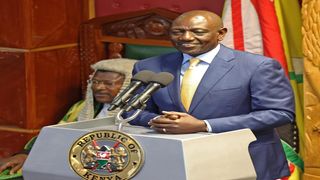
President William Ruto speaking at Parliament on November 9, 2023, during the State of the Nation address.
| PCSOur Columnists
Premium
How to fact-check Ruto’s State of the Nation address in 200 words
The Nation’s fact-checking of President William Ruto’s State of the Nation address could have been done in a more crisp manner—in less than 200 words, or a two-minute read. Instead, readers were treated to more than 700 words that belaboured unnecessary findings, thus diluting the impact of the fact-checking.
What is fact-checking? Why is it important? Fact-checking ensures the content of a story is accurate and reliable. The hallmark of journalism is accuracy and reliability. Content that is not factual can mislead people, influence their opinions or lead them to make wrong decisions.
That is essentially why the Nation fact-checked the SOTN address and published the findings last Friday (“Fact check: What did President Ruto say during State of the Nation address?” by Daisy Okoti, Mercy Chelangat and Mike Yambo, Nation.Africa, Nov. 10, 2023).
The findings were not, however, published in the Daily Nation. The newspaper chose to, instead, run an opinion article by Bernard Mwinzi analysing the speech. The article found the speech “heavy on data and light on sentiment” (See “Analysis of President’s speech shows that it was heavy on context and light on emotion and call to action”—Daily Nation, Nov. 10. 2023).
How or why
For readers, the utility of fact-checking depends on how it is done and presented. Most importantly, fact-checkers should not simply tell them something is false; they must show how or why. Example: President Ruto said “a 2kg packet of maize flour is selling at a low of Sh145 and a high of Sh175”.
The Nation researchers countered this by saying: “FALSE; A 2kg packet of maize flour is retailing at an average of Sh200.” This would have been more convincing if the researchers showed how they arrived at the average of Sh200.
Fact-checkers must also avoid confirmation bias; they should ensure they are not (subconsciously) seeking to affirm their own bias, expectations, ideas or beliefs.
The Nation researchers said they selected what to fact-check based on “the key issues the President spoke about, and the key pledges he made”.
The topics they chose ranged from financial allocations to the Judiciary to the price of fertiliser, employment of healthcare workers and free WiFi hotspots.
The selection of what to fact-check should be based on the need to ensure accuracy, completeness and currency of the information.
The purpose is to prevent the spread of bias, inaccuracies, misinformation and disinformation. Statements that often need to be counter-checked include controversial, accusatory or self-serving claims, lies and opinions masquerading as facts.
The maker or source of the information may also be important in selecting what to fact-check. Is the maker or source of the statement a Donald Trump with a reputation for lying and making misleading statements? Does he have authority, knowledge or expertise to make those claims? If a politician, is he lying to get into office or stay in office?
Journalists should always be sceptical in this post-truth era, when “alternative facts” are in vogue and misinformation and disinformation common. They should seek corroborating evidence in such cases or if they smell a rat.
On the other hand, if a piece of information is in the public domain, there may be no reason to fact-check. For example, it was unnecessary for the Nation to counter-check if President Ruto had allocated the Judiciary an extra Sh3 billion. That was already public knowledge.
The researchers checked 21 statements. They found 11 of them to be “true”, two “possibly true”, one “partly true”and two “in progress” while there was “no available data” for one. Only two of the statements were found to be “false” and two others “partly false”.
These findings were presented to readers in a 719-word write-up (about the length of this column) under a subhead “Claim Verification”. However, this write-up could have been shorter—about 200 words—and punchier if only the untrue statements were included. The true statements did not require the researchers to say they were.
The Nation researchers succeeded in removing the sting out of the fact-checking by crowding out the false statements with true statements that nobody had suggested were false and, therefore, required no verification.
- The Public Editor is an independent news ombudsman who handles readers’ complaints on editorial matters including accuracy and journalistic standards. Email: [email protected]. Call or text 0721989264.





